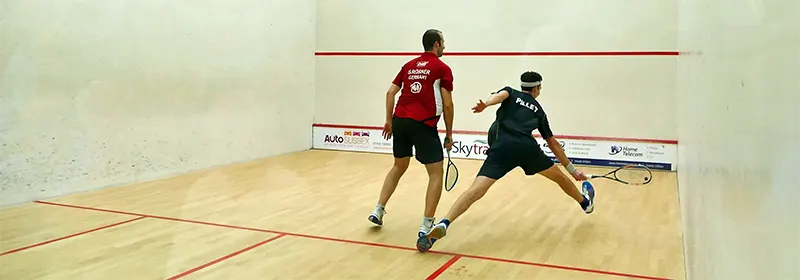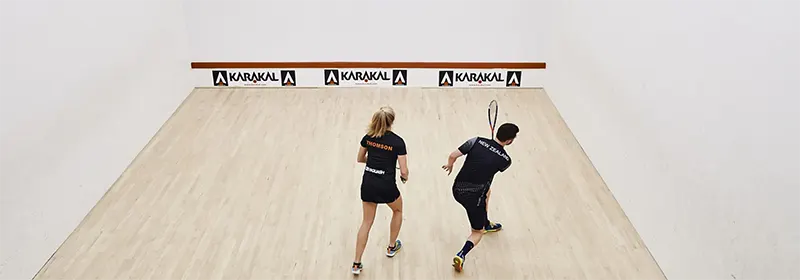10 November 2022 / 3-Min Read / Translate
Let’s start by clarifying the difference between “game” and “match”, just in case you don’t know. A match is the total number of games, which are usually up to 11 points. Some matches are the best of 3 (games) meaning you need to win 2 games, and some matches are the best of 5, meaning you need to win 3 games.
There are some exceptions to that but nothing we need to worry about today. For this article, I will use the best of 5 games system.

I wonder which game this is
This should be used to “set the tone” of your approach to the match. If you plan to play long rallies, your objective here is to make each one as long as possible. Clearly, this is an approach that requires confidence in your fitness, as well as mental fortitude. It’s also the opportunity to look for weaknesses in your opponent’s play, especially if you have never played them before. Who wins the first game is rarely an indicator of who will win the match. That’s one of the beautiful things about racket sports, split into games, is that each game can be completely different from the previous one. More important, although again not a definitive guide, is the manner of the win.
Before you think I am advising making the first game as long as possible, if your approach is to take your chances early, then commit to that. I’m not saying go for crosscourt nicks on every service return, just be clear on what is and what isn’t a chance. That approach favours the brave, but it also has lots of risks, so use with caution. I want you to finish the first game knowing that you have made your opponent work hard and that you have a better idea of what to try in the next game.
Importance Level: Low
Things need to change or things need to stay the same. Yes, that’s a tautological statement, but too often I’ve seen players change what they are doing, even though they were winning. So, if you won the previous game by playing simple hard squash, keep doing that. Winning a squash match is not a competition in creativity, it’s about winning points. Of course, if you lost the previous game, then unless you are absolutely convinced that your tactics are right, you need to do something different in this game.
If you did win the previous game, then expect your opponent to play in a slightly different way. Your problem now becomes finding ways to get the same results i.e. winning the game, by negating your opponent’s changes. Whatever you decide to do, you must avoid silly mistakes at all costs – there’s no reason to gift points to your opponent.
Importance Level: Low to mid

Looks like a practice session to me
The score determines the importance level of this game. If you are 2-0 up then you could afford to lose this game, but clearly you want to win 3-0. If you are 0-2 down, then it’s critical to win this game, and at 1-1, you are both well-placed to gain the advantage. Personally, I feel that even if you are 2-0 up or 0-2 down, you need to view this as a critical game. Finishing the match quickly is good for your confidence, sends a message to other players and limits your effort. As with the previous game, don’t make an drastic changes unless you absolutely have to.
If you are losing, then clearly it’s time to try something new, but you must not panic. This fear will be evident in your game and your opponent will smell blood and go in the for kill. Each point you lose will amplify that fear and desperation will set in. It’s a snowball effect. I know it’s easy for me to say “be patient”, but if you rush the points then the likelihood is that you will play worse. Better to go down fighting 0-3, than lose that third game by playing silly squash.
With the score at 1-1, you need to stick to your gameplan. Keep things simple and not think ahead. Play each point as it comes and don’t worry about the score.
Importance Level: Mid to critical depending on the score.
Not only is the score important, how it got there is too. This game is by the far the hardest to evaluate, but what is clear is that the importance level is high to critical. If you came back from 0-2 down then you want to keep your momentum. If you played at a high tempo, keep doing that, if you slowed the game down, continue to do that. Of course your opponent will try some new tricks, but like the previous – stay patient. A 3-1 win is still a win.
Now, if you were 2-0 up and lost the previous game, it’s definitely not the time to panic. But neither should you relax. What was different in the previous game from the other two? Did you start thinking about winning the match instead of focusing on each point as they happen. Did you try some new tactics in the hope of winning quickly? Whatever you did in the first two games, keep doing that if you can.
Importance Level: High to critical.
This is it! Do or die! The winner of this game is the winner of the match. Honestly, in my opinion, it’s the mental strength that decides 90% of these games rather than the tactics. I can’t stress enough how you need to be patient and continue to do what is working. I vividly remember a pupil, lose the first two games of a match with attacking shots that hit the tins, she clawed back to 2-2 with attritional play, only to throwaway the 5th game by hitting attacking tins. Her words to me between the 4th and 5th game “I know I can beat he by hitting winners”. Nothing I said would change her mind. She chose the wrong tactics and lost. She did this because she lacked discipline to play the effective but boring style.
I’m not saying you can’t play attacking squash and win, but if that style hasn’t worked already, it’s unlikely to now. Don’t make it easy for your opponent, but if the chance presents itself, be fully committed to it.
Threat Level Midnight! (a joke for US The Office viewers) CRITICAL
No article like this can cover all the possible situations you face in games and matches, but some elements are common to club players. If you often find yourself coming back from 0-2 down or losing from 2-0 up, you need to question what’s happening. It cases like this it could be fitness, or it could be lack of preparation, i.e. not heating up properly and losing the first two games.
Try to identify patterns. For example, I usually played really well in the first two games because I wasn’t worried about the score, but from the third game onwards, I started to worry about the result NOT the process. Even just being more aware of the ebb and flow during matches can be enough to spot areas to improve upon.